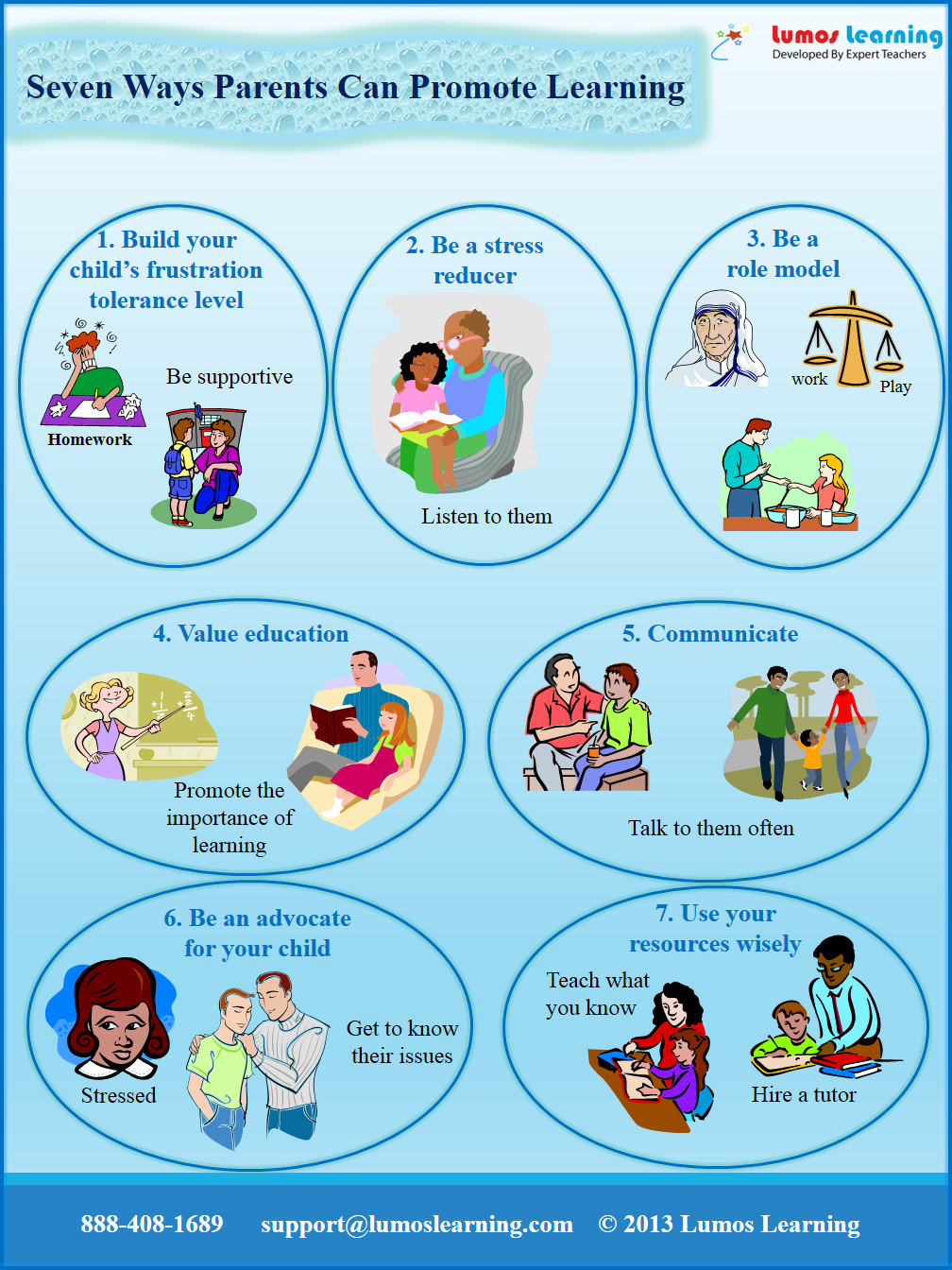As a parent, you serve multiple roles – chauffeur, housekeeper, breadwinner, counselor, role model. When it comes to your child’s education, you may wonder what you can do to promote learning… especially if you don’t feel confident in all subject areas. However, you don’t need a degree in education to enhance your child’s educational experience. With these simple ideas, you can make a positive contribution by creating a supportive structure and environment for him/her to allow for optimum learning:

1. Build your child’s frustration tolerance level:
Children who persevere learn how to be resilient in the classroom: a “can-do” attitude goes a long way when being asked to solve a challenging math problem, complete a complicated science lab, or write a term paper. At home, you can foster the ability to persist in the face of adversity by not always stepping in at the first signs of discomfort. Encouraging your child with supportive comments such as, “I know you can do this,” or “I have confidence that you can figure this out,” allows your child to grapple with the situation and problem-solve in new ways to come up with solutions. Of course, if your child is having a complete meltdown, you may need to step in – but only to provide just enough support to get him/her back into a frame of mind to tackle the problem. Once your child weathers the “storm”, he or she will feel empowered and develop a sense of efficacy that would not occur if someone else instantly came to the rescue.
2. Be a stress reducer
Even as you help build your child’s frustration tolerance, you also don’t want to be a constant creator of frustrating scenarios. There is a delicate balance, and your role also needs be that of a listener – one who is supportive and empathetic about your child’s feelings. Really listen to your son or daughter, and don’t accept “fine” as the answer to the question, “How was your day?” Without being a nag, probe a bit more, and when your child does express sadness, anxiety, or anger, be there for your child. This doesn’t mean that you enable him or her and try to make the problems disappear, though: sometimes simply allowing your child to vent is enough. At other times, you can collaborate and devise a game plan to tackle a challenging situation. And in extreme cases, you may need to advocate for your child (for example, if your child is being bullied).
3. Be a role model:
This includes eating, sleeping, balancing work and play, and being a life-long learner. The adage that actions speak louder than words is true, and when your son or daughter catches you reading a book (just for the fun of it!), he or she may consider reading an activity people enjoy. Or, if you show your child that you sometimes take a break from your work to clear your mind, that habit may become ingrained in your son/daughter. Watching you exercise and eat healthfully conveys the message that you value these activities. Healthy, well-rested, emotionally-stable individuals stand the best odds of success at school, and your child can certainly learn more in a relaxed, healthy state that s/he has learned from watching you.
4. Value education:
If you constantly put down your child’s teachers, or complain that the work being done in class is worthless, you are setting your child up for dismissing education altogether. Certainly address educational concerns you have privately with your child’s teacher should they arise, but in general try to consider ways you can promote the importance of learning. Explaining how what your child is learning can be applied in certain careers makes concepts from class seem important and transferable.
5. Communicate:
This is especially important in the adolescent years, because this can be the period of time in which your child shares less and less as peers become more influential. But even if your child resists talking, try to encourage some sharing. Ask open-ended questions that require more than a yes or no response, and if that’s not working, ask more direct questions that require some sort of answer, even if it’s a very short response. Showing a sincere interest lets your child know you care, and even though this is not a direct link to learning, it stands to reason that children coming from a supportive home environment are more likely to feel that their education is valued, that they can ask for help (academic or otherwise) when they need it, and all of this betters the odds for success at home and at school.
6. Be an advocate for your child:
If your child is experiencing stress at school (by being bullied, having friendship issues, etc.), this will directly impact learning. Think about it: when you are stressed out, depressed, or anxious, how well can you function at work? School for a child works in a similar fashion: if your son/daughter is distracted by negative people, actions, etc. it will be more difficult for your child to concentrate and focus on academics. Many states have made it easier than ever for parents and students to report bullying incidents and have them addressed in a timely fashion, and if the problem is not related to bullying, guidance counselors are still available to address all concerns. Clearly, if you are using tip #5 by communicating frequently with your child, you will become aware of issues and can address them early on.
7. Use your resources wisely:
Are you a history buff? Become the social studies tutor when your child needs help. Good with numbers? Assist your child with math facts and math homework in the evenings. And though not all parents are jacks of all trades when it comes to school, leverage your areas of strength to help your child with studying, homework and projects. And as for your weak areas? Look around: between neighbors, older children in the neighborhood, friends, relatives, and other parents, you may be able to strike a mutually-beneficial arrangement. For example, maybe one parent helps with math while you’re the go-to science expert. If this isn’t feasible, consider hiring a tutor as needed. Or, if money is an issue, look to your school for affordable and free options for extra help. Just knowing where to go and what resources are available will help connect your child with any academic support she or he needs at any given time.
There’s an added benefit to utilizing these tips: you’ll help foster a well-rounded, successful child…in all areas of life!









I couldn’t refrain from commenting. Very well written!
Great site you’ve got here.. It’s difficult to find high quality writing like yours these days.
I truly appreciate individuals like you!
Take care!!
Pingback: 7 Ways Parents can Promote Learning – Sevent & Final Point | Think Educative
Pingback: Think Educative | 7 Ways Parents can Promote Learning – Sixth Point
Pingback: Think Educative | 7 Ways Parents can Promote Learning – Fifth Point
Pingback: Think Educative | 7 Ways Parents can Promote Learning – Fourth Point
Pingback: Think Educative | 7 Ways Parents can Promote Learning – Second Point
Pingback: Think Educative | 7 Ways Parents can Promote Learning – Third Point
Pingback: Ways Parents can Promote Learning | Thinkeducative